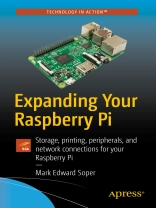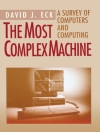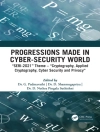Gain a deeper understanding of how Raspberry Pi works to get the results you want right in the palm of your hand. This book helps you understand the right connections and software to drive your Raspberry Pi into opening the worlds of programming, electronic experiments, system control, digital imaging, and the Internet of Things to you.
You’ll discover how to expand your Pi’s storage for bigger programs, use its onboard connections to interface with cameras and control devices, printers and scanners. You’ll also see how to share information with Windows and Apple computers and mobile devices, and use it away from AC power. You’ll be able to turn any HDTV into a media player; stream and share files from desktop and mobile devices; use your Pi for image capture via camera or scanner; and more!
Expanding Your Raspberry Pi is your guide to doing almost anything a bigger computer can do – if you’re ready for the challenge.
What You’ll Learn
- Connect, use, and manage mass storage devices for greater versatility
- Link with desktop, laptop, and mobile devices using the Pi’s built-in Wi-Fi and Bluetooth features
- Share resources from your Pi with desktop and mobile devices
- Capture video and still photos with your Pi
Who This Book Is For
Network administrators: Connect Raspberry Pi devices to other devices on a wired or wireless network for media streaming, file serving, or print serving
Teachers: Use Raspberry Pi to teach students how to connect different types of computers and operating systems with each other.
IT workers: Use Raspberry Pi with your existing printers, scanners, webcams, and home network
Tabela de Conteúdo
Chapter 1: Raspberry Pi System Anatomy.- Chapter 2: The Distro Bunch .- Chapter 3: Adding Mass Storage.- Chapter 4: Connecting to a Workgroup Network.- Chapter 5: Sharing an Internet connection.- Chapter 6: Setting up a print and scan server.- Chapter 7: Imaging and Video.- Chapter 8: Media Serving.- Chapter 9: GPIO Anatomy and Applications.- Chapter 10: Taking Your Raspberry Pi on the Road.
Sobre o autor
Mark Edward Soper is an internationally-published expert on technical topics ranging from Comp TIA A+ Certification to Microsoft Windows and an instructor who has taught thousands of students in industry seminars and employee training about computer and device troubleshooting and repair, digital imaging, Microsoft Windows, and networking. Mark has seen the industry change from an emphasis on understanding hardware and what makes it work to the computer as appliance. He’s excited to see that devices such as the Raspberry Pi are not only useful for teaching how computers work but can also be put to work in home and business environments.












